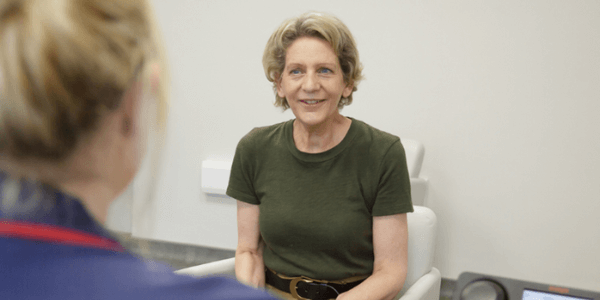Health Hub
What happens if you think you have gynaecological cancer?

Gynaecological cancer is cancer that affects one of the female gynaecological organs – either the womb, cervix, ovaries, vagina or vulva.
Each of these types of cancer have varying symptoms, including unusual vaginal bleeding, postmenopausal vaginal bleeding, abdominal bloating and/or pain and a visible or palpable lump or mass. Some may not have any significant symptoms. We go into more detail in our Health Hub article, Different gynaecological cancers and their symptoms.
In this article, we’re going to explain what happens if you’re referred by your GP for further tests and investigations for gynaecological cancer.
What are the chances I have gynaecological cancer?
Noticing something that’s different or unusual to you and your body can be a worrying time. But if you think you may have one or more of the signs and symptoms of gynaecological cancer, it’s important to speak to a doctor as soon as possible.
1 in 20 women referred to a specialist by their GP will have cancer, meaning that 19 in 20 won’t, and that their symptoms can be attributed to something else. If you do have cancer, the earlier it’s detected, often the better your chances of successful treatment.
When should I see my GP?
If you notice anything that’s out of the ordinary to you, or that concerns you, make an appointment to speak to your GP.
Examples include:
- Unusual vaginal bleeding
- Vaginal bleeding after the menopause
- Pain or discomfort in your lower abdomen or back
- A general feeling of being uncomfortable in your lower abdomen
- Abdominal swelling and bloating that doesn’t go away
- Frequent urine infections
- An increased frequency or urgency in urination
- Sharp stabbing pains in your vagina
- Pain or bleeding during or after sex
Your GP will talk through your symptoms and how long they might have been going on for. So it’s helpful to have some notes with you that include what type of symptoms you’ve been experiencing, when they occur, and for how long.
Never feel like you’re being a nuisance or that you’re being “over the top”. It’s always best to get anything unusual checked out.

What tests do I need to get a diagnosis?
If your GP thinks that your symptoms require further investigation, they will refer you to a specialist, usually in a hospital or clinic setting. Remember, 1 in 20 women referred for further tests will go on to have a gynaecological cancer – 19 in 20 won’t.
Your specialist will arrange the appropriate examinations and investigations, depending on your symptoms. This will usually include various blood tests and then possibly a variety of different scans.
For example, if you have postmenopausal bleeding, your doctor may want to exclude the possibility of womb or cervical cancer. To do this, they may organise a cervical screening test (previously referred to as a smear test) as well as a cervical biopsy.
A cervical biopsy is more uncomfortable than a smear test, but can still be performed in a clinic or doctors office, with pain relief provided.
An ultrasound may also be performed by an expert qualified to look for any abnormalities such as a thickening in the lining of the womb (called the endometrium). This may also be used to inform your specialist of the best place to take a biopsy of the womb lining. This tends to be more uncomfortable than a cervical biopsy, but again, pain relief will be provided.
Sometimes, a procedure called a hysteroscopy is performed, whereby a long, thin surgical telescope is passed into the womb through the vagina and cervix. This allows your medical team to gain a better understanding of what may be causing your symptoms. Depending on circumstances, this may be performed under a general anaesthetic. You can find out more about hysteroscopies by watching our explainer videos.
If you have abdominal pain, discomfort or swelling, your doctor will have a feel of your tummy area, and may then request an abdominal ultrasound to take a look at the health of your ovaries.
An ultrasound scan isn’t always sufficient for detecting whether changes are benign (non-cancerous) or not. Therefore, you may also be sent for an MRI or a CT scan (or both).

An MRI scan takes around 45 minutes, and will require you to lay still on a bed as you’re passed through a scanning tunnel. The device doesn’t touch you, and therefore it isn’t painful. However, some people find the experience claustrophobic. Your medical team will be on hand to give you all the support you need.
A CT scan is a quicker procedure and not as claustrophobic. It looks at the abdomen and chest area, to check the extent of any abnormalities and will help to determine what’s causing them.
All of these tests and investigations are very effective at excluding or confirming the presence of cancer.

What happens after my tests and investigations?
After you’ve had all of the necessary examinations, a multidisciplinary team of doctors and other experts will meet to discuss your results.
If your medical team rules out cancer, you may then be referred to a different specialist to investigate further or arrange treatment for a different condition.
If they find the presence of cancer, they will then discuss the results with you, including the grading and staging of a tumour or pre-cancerous cells and what treatment options you have.
Lots of people are involved in the process, including behind the scenes pathologists and scanning experts who will look at your bloods, biopsies and scan results, and all will help to provide you with the information you need to make informed decisions about your treatment.
A multidisciplinary team is just as important during your treatment as it is during your diagnosis. The regular multidisciplinary team meeting approach to patient treatment and management is vital to ensure that nothing is missed and all disciplines, from surgeons to oncologists and nursing teams give you the best, most consistent, care. It also gives all disciplines the opportunity to suggest other tests and possible treatments that may also help.
Once they’ve decided on the best way to progress, they will talk to you about your options, what your treatment may involve and to offer you support in all areas of your cancer journey.
Watch our informative Gynaecological Cancer Explained webinar to learn how our multidisciplinary team can help provide you with an individualised care plan to support your diagnosis and recovery.
More information
- If you’re concerned about gynaecological symptoms of cancer, speak to your GP who may refer you to a specialist. (Don’t have a GP?)
- The King Edward VII Hospital’s Genecology department is equipped with the latest technology, services and staff to diagnose, treat and manage all types of gynaecological cancers.
Article Sections
Latest Hospital News
Should you wish to speak to our press team, please visit Press Enquiries




